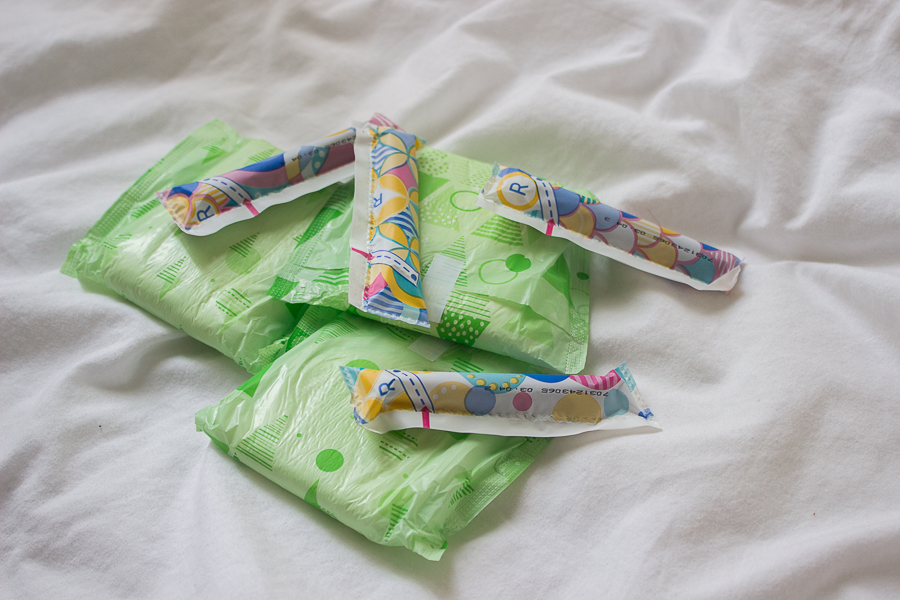
Menstruation continues to be a taboo topic — yet it’s central to women’s lives
 We’ve all heard of “the little red friend,” “shark week,” “lady business” — but why do we shy away from properly addressing menstruation? After all, it occurs in approximately half of the world’s population. Despite our forward-thinking, incredibly liberal era, few are comfortable with speaking openly about periods. Society continues to enforce the misconception that menstruation makes a woman dirty, unclean or shameful, when in reality menstruation is a natural occurrence that shouldn’t embarrass anyone.
We’ve all heard of “the little red friend,” “shark week,” “lady business” — but why do we shy away from properly addressing menstruation? After all, it occurs in approximately half of the world’s population. Despite our forward-thinking, incredibly liberal era, few are comfortable with speaking openly about periods. Society continues to enforce the misconception that menstruation makes a woman dirty, unclean or shameful, when in reality menstruation is a natural occurrence that shouldn’t embarrass anyone.
A period is a constant, empowering reminder to women that we reserve the potential to grow life. It’s therefore something that should be celebrated and appreciated as a natural and perhaps even powerful phenomenon.
I first began to reflect upon the deep-rooted misogyny of period stigma when I read about Instagram’s involvement in suppressing the expression of Rupi Kaur. Kaur is now recognized as one of the most influential, feminist, inspiring and talented poets today. In her poetry and photography, she delves deep beneath the surface of societal constraints placed on women, specifically minority women, in order to fight them. Almost three years ago, when Kaur posted a picture that happened to include her pants dotted with a smudge of period blood, Instagram removed the photo twice, inciting the young poet to publish a Facebook post that went viral. Thus, the menstrual movement began with her words, “Their misogyny is leaking. We will not be censored.”
We can categorize the societal issues regarding menstruation acknowledgment into two sections: the significant psychological and health-related impacts on financially secure women predominantly in developed countries and the horrific plight of impoverished women throughout the world, especially in underdeveloped nations.
Periods can’t be understood without recognizing the plethora of menstrual health issues that can occur, ranging from severe period cramps to toxic shock syndrome, a fatal bacterial infection. But women are largely ignored when they are concerned about their menstrual health and speak out about any related pain. A survey conducted for Australian women found that 75 percent of women said period pain has affected their ability to work, but only 36 percent of these women approached an employer to speak openly about it.
Another study conducted in the U.S. determined that 77 percent of women felt like their period was something they simply had to put up with, and 74 percent said that men have an advantage due to their lack of menstruation. 84 percent reported feeling moody, yet the mood change offset by Premenstrual Syndrome (PMS) is something mocked constantly, with many people pinning a woman’s disposition onto PMS, thus inciting her to feel ashamed of her own emotions.
It’s also important to realize, before truly understanding the struggles of many international female populations, that menstrual products are not always accessible, affordable or acceptable in specific areas. To remain hygienic, the average woman needs to change her pad four times a day, and the average period lasts five days. But in Afghanistan, a single menstrual pad costs $4 USD, which bills up to $80 for one period and $960 for one year — almost one grand spent on menstruation alone. 62 percent of Afghani schoolgirls use torn cloth as pads, a very dangerous and unhygienic substitute. Schoolgirls in Kenya miss, on average, 4.9 days of school every month due to their periods, adding up to about 20 percent of the school year when compounded over 12 months.
In Nepal, many women are banished from places of worship, farms, kitchens and their own homes to live in a secluded hut without access to food or water for the duration of their cycle, sometimes leading to death. Japan holds onto the belief that women can’t be sushi chefs because their sense of taste is apparently affected by menstruation. And in Pakistan, sexual education is banned, depriving girls of the chance to learn about and understand their own periods. The list of absolutely unacceptable behavior toward women on their periods goes on and on.
Women should be treated with respect and care when menstruating, not scorned with disgust and thrown out of their homes. Periods don’t make a woman unfit to be touched or be near, and they certainly need to be talked about to appropriately educate young women. Currently, we’re living at the peak of the menstrual movement. Innumerable organizations dedicated to educating young women and donating menstrual products to those who can’t afford them are popping up throughout the world. One significant organization chapter is right on the UC Davis campus: PERIOD, an organization dedicated to destroying the stigma of periods and donating menstrual hygiene products to populations in need. Several companies and regions are allowing women to take days off of work due to period pain, and the World Bank is working toward keeping girls in school by improving their menstrual hygiene.
Why are we so afraid to allow women to feel comfortable, confident and proud of their periods? Menstruation should be defined by the power it gives women and celebrated as a key component of femininity and womanhood, never something to hide or feel ashamed about. This is the time to start conversations about menstruation, to speak openly about the struggles faced by menstruating women everywhere in order to find solutions to preserve the hygiene of every female inhabitant of our world. It’s time to start taking women seriously when they discuss their needs. After all, who knows more about a woman’s health and needs than the actual woman herself? Let’s give her a voice for once.
Written by: Akshita Gandra — agandra@ucdavis.edu
Disclaimer: The views and opinions expressed by individual columnists belong to the columnists alone and do not necessarily indicate the views and opinions held by The California Aggie.










